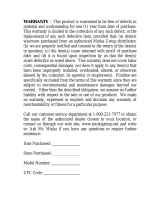
Limited Lifetime Warranty
Minka-Aire warrants to the original owner that this fan will be free from defects
in material and workmanship for one year from the date of purchase, excluding the
motor. Minka-Aire warrants to the original owner that the motor in this fan shall
be free from defects in material and workmanship for as long as the original pur-
chaser owns the fan, and it remains in the original installation.
This is a limited warranty. Minka-Aire's only obligation under this limited
warranty is to replace or repair, or refund the purchase price, in Minka-Aire's sole
discretion without charge to the original owner, of the fan once Minka-Aire con-
firms that the fan has a defect covered by this limited warranty.
Call our customer service department at 1-800-307-3267 to obtain the name of
the Minka-Aire authorized dealer closest to your location, or contact us through
our web site, www.minkagroup.net and write to: ask Mr. Minka if you have any
questions or require further assistance.
To obtain warranty service, the owner should return the fan along with proof of
purchase to a Minka-Aire authorized dealer. The Minka-Aire authorized dealer
shall then, at its sole discretion: repair the fan, replace the fan, refund the purchase
price less the amount directly attributable to the consumer's prior usage of the fan,
or if necessary instruct the consumer to contact Minka-Aire directly for warranty
service. Minka-Aire will be responsible for the cost of any repair, or replacement
for any warranty service provided by a Minka-Aire authorized dealer for product
under warranty.
You may also at your preference obtain warranty service by returning the fan
directly to Minka-Aire along with proof of purchase, your name and return address,
and a description of the claimed product defect. Pack carefully; damage sustained
in return transit to Minka Aire will be the original owner's responsibility. Original
owner shall be responsible to pay all shipping charges. To obtain warranty service,
you may return a fan that proves to be defective during the warranty period to the
following address:
Minka-Aire
Warranty service
1151 W. Bradford Court
Corona, CA 92882
This warranty shall not apply to fans which have been damaged in any way,
including improper installation, damage as a result of the removal of the fan from
the original installation, or damage in shipping. This warranty shall not apply to
fans which have been subjected to use for which the fan was not designed. The
purchaser of the fan shall be responsible for any cost of removing the old fan,
installing a new fan, or any other costs.
This limited warranty is in lieu of all other express warranties. This limited
warranty excludes all incidental and consequential damages, and Minka-Aire shall
not under any circumstances be liable for incidental or consequential damages.
Some States do not allow the exclusion of or limitation of incidental or consequen-
tial damages, so the foregoing limitation or exclusion may not apply to you.
This warranty gives you specific legal rights, and you may also have other
rights which vary from State to State.
We encourage you to promptly complete and return the enclosed warranty
registration card. However, return of the warranty registration card is not a condi-
tion of this warranty.
F546-MKA4010101›^ƒŁ-0125 1/25/2005, 1:52 PM1


























